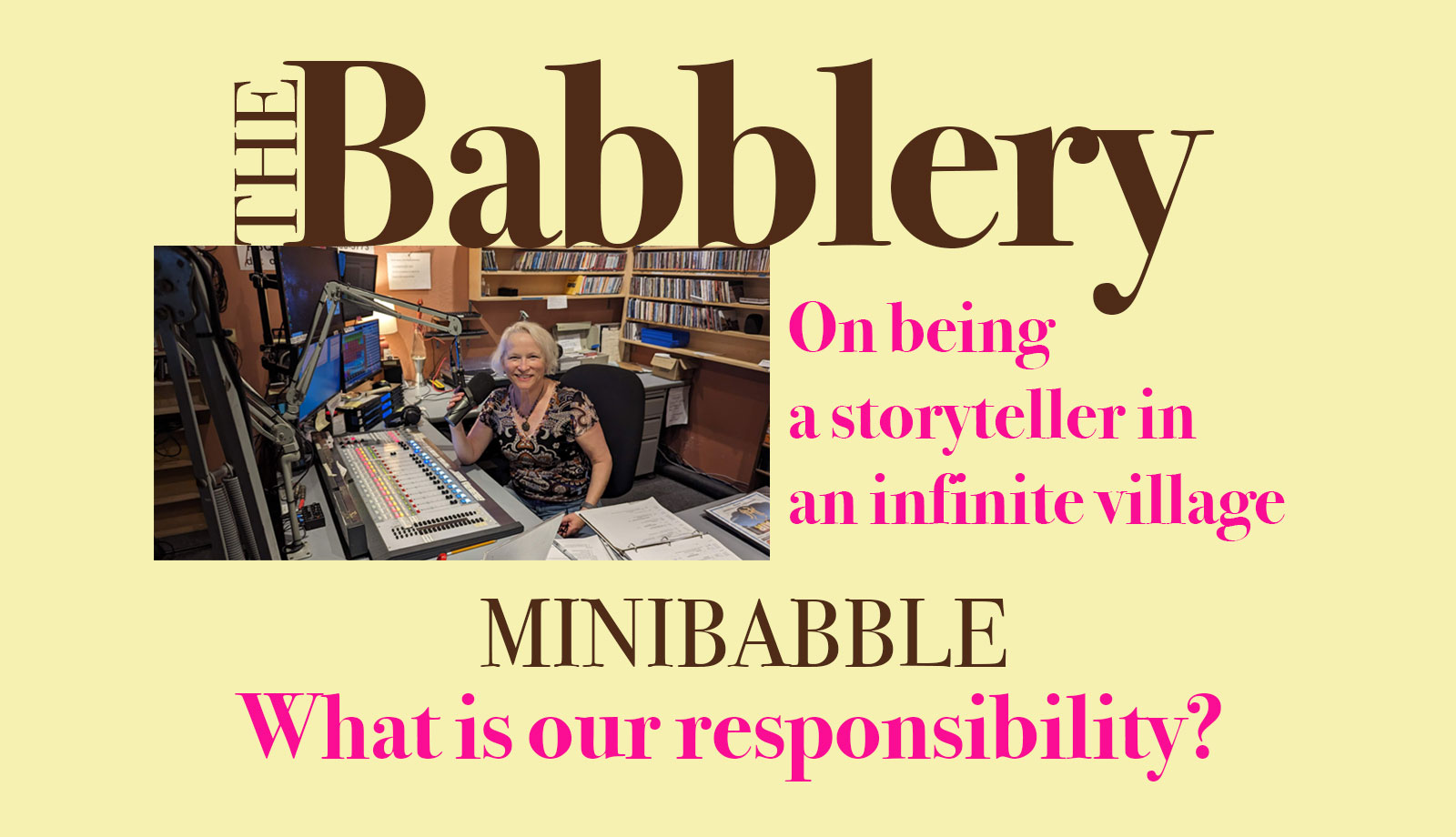
Near the end of my recent interview with Brenda Laurel, she talks about the responsibility of content creators in our current world.
“What we can do, what I hope we can do, is begin as, and continue, as culture makers, you know, as culture workers, to shape our culture in such a way, through our efforts, that lifts up compassion.”
This is perhaps the crux of what’s wrong with online culture. We are now all creators of content that goes out into the world, but very few of us have the training to recognize our ethical responsibilities, and even fewer have editors to hold us back when we’re tempted to go too far. Before the Internet, the Web, and then social media, few people without training and editors made it into everyone’s living rooms.
I grew up in a time when our television got a few stations, and all of them were constrained by the Fairness Doctrine, by service to advertisers, and by the watchful eyes and ears of people who cared about what entered their communities and felt they had the power to stop the worst of it. (And sometimes, parenthetically, they stopped legitimate criticism also, but that’s the subject of a completely different Babble, so on we go.)
Hank Green, in his excellent recent piece, Populism, Media Revolutions, and Our Terrible Moment, tries to explain how this moment came to be. He hopes that it won’t take us the next 200 years to climb out of it the way it did when the printing press gave voice to radical elements in society leading to years of conflict.
But Laurel and Green, at the same time as being critics of our current era, are successful builders of it. Brenda Laurel’s career built the very idea of interactivity into video games and virtual reality, and that idea continues with social media. Hank Green and his brother built careers on the nascent YouTube, speaking to each other without editors, in front of a border-free audience who, with their clicks, raised the Greens’ profiles and sent them viral.
In Green’s piece, he points out that good has always come from these convulsions of culture that happen with technological advances. The Reformation led to the idea of religious and then political self-determination, which led to the formation of democracies around the world.
Radio and television, two convulsions of the 20th century, may end up being seen as footnotes to the larger revolution of the Internet. But all three of these technological advances worked to connect people in a wide exchange of ideas that a printing press owner couldn’t have dreamed up.
The question for me when I think about these ideas and I wonder about the time we’re living in is not any big question about where we are headed. That’s way above my pay grade.
The question I ask is a small one: What is the responsibility of each and every one of us who are sending our work out into the world? Whether our podcast has a few listeners or hundreds of thousands, in the scheme of things, we all have the same responsibility, and Brenda Laurel said it better than I could:
“It’s up to us as culture workers—you, me—to create conditions in which we have alternatives that are compelling enough to draw people in. And that’s a tough call. It’s always harder to do the good thing. It’s always harder. And my advice to anybody who complains about it is, suck it up. It’s our job.”
And it is hard, especially in this time when we creators can’t help comparing ourselves to others. In ancient times, I might be a village storyteller, feeling a sense of importance simply in carrying on our tradition.
But my modern village is endless, and I can see everyone else in this border-free village. I could spend every day, all day, comparing my numbers to others, comparing the quality of my production, comparing my ideas. But of course, there’s no point to that. In our infinite village, each storyteller has to take responsibility for themselves and only themselves.
So perhaps the hardest thing I can do is just to keep my head down and focus on what I feel is important, whatever that is.
Which gets back to the responsibility of people who create anything.
When I was a young writer, I read and internalized John Gardner’s On Moral Fiction. Whether you’re doing stand-up comedy, producing a podcast about makeup techniques, or trying to make viral memes for social media, you are making statements with your work. Your work is representing you, and you can’t get away from that.
Perhaps this is what we’re suffering from in this enormous convulsion of culture we’re living through. We forget that what we say on the Internet is real. We forget that we are real. No matter how many or how few followers we have, we take on an awesome responsibility as content creators, as people who create anything:
You, me. It is our responsibility to shape our culture in such a way that, through our efforts, lifts up compassion.
And that’s hard.
Thanks for listening. Click here to listen to the full interview with Brenda Laurel.
- The song “Where the Magic Happens” is by Steviasphere on Bandcamp
- Play Like a Girl” is by June and Jean Millington, courtesy of the freemusicarchive.org

